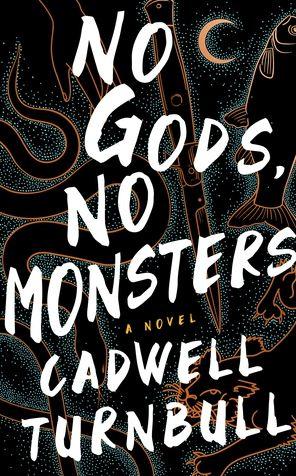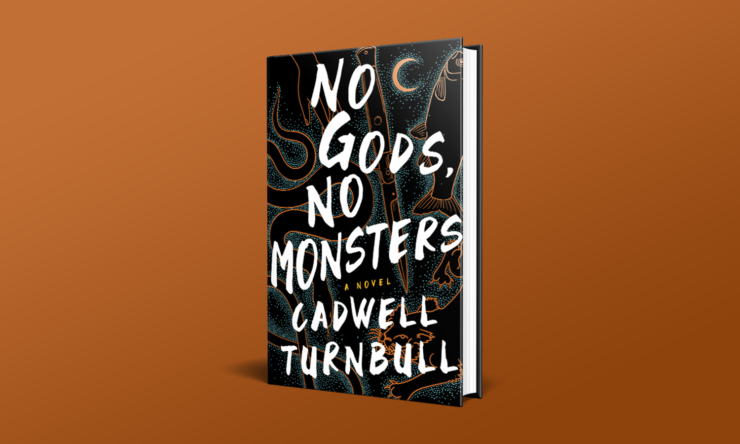Let’s get this out of the way upfront: Cadwell Turnbull’s second novel No Gods, No Monsters is absolutely worth your time. If you’re at all a fan of science fiction and fantasy, if you’re at all interested in deep characterization and interiority playing out against the fantastical, if you’re into the interplay of how genre can operate in conversation with the real world, if any of that is your bread and butter, then you’re good; you can stop reading this review and go pick up the book. You’re welcome. If you’re still here, let’s do this thing.
No Gods, No Monsters is the story of our world waking up to the fact that there has been another, stranger world living right alongside ours, and no one has ever been the wiser, not until the Fracture. But when Laina gets footage of her brother being shot by a police officer, she watches as his body is the one on the ground, not the massive wolf the officer had shot. Harry has been finding clues in papers leading to a secret society, full of people who know what’s been going on, and he wants answers. Ridley just wants to keep his bookstore open with Laina, but his glimpse of the world beyond has him shaken. From section to section, Turnbull builds an impressive cast of individuals who have only seen the barest glimpse of this other world, and there on the fringes between belief and willful ignorance, does No Gods, No Monsters builds.
Buy the Book


No Gods, No Monsters
I can’t get over how impressive this book is. Where many other writers would have taken two secret societies of monsters and magicians and shoved them into the spotlight as the highlight of the book, Turnbull barely spends any time with them. And when he does, none of them ever look right at the reader with answers; they, much like the day-to-day humans of this story, are just as caught up in their own complex web of relationships and hardships and fears. The struggle between these two otherworldly factions are only hinted at, and only seen from the edges of comprehension; Ridley gets a glimpse of an otherworldly titan at his co-op meeting, Laina learns bits and pieces of Shifter lore from her girlfriend as much as she comes to know her estranged brother, and Dragon, a young boy with monstrous gifts, is more concerned with his own safety and survival than he is with the concerns of secret societies.
What you get from this formula of plot is much better than the standard focus on these secret societies. What Turnbull has made a priority, among many things in this novel, is the laser focus on character interiority and perspective. The fringe of the epic story is only barely seen through the eyes of characters who are more concerned for what happened to their brother, their home, their relationships, their career, their communities, their very survival than they are with what magician is fighting what monster. As such, Turnbull hijacks the very novel so that the reader is only learning things as our protagonists learn them and uses en media res action combined with complex character POVs to build the world of No Gods, No Monsters. What you get from all of this is a novel in which the reader (rightly) cares more for the characters caught in the middle of this whirlwind than they do for the storm itself.
And for all that the above balancing act requires, Turnbull refuses to smooth over or shove aside the complexity of the everyday world we live. The novel begins with the shooting of an unarmed Black man by a police officer, whose body cam footage goes missing. Laina’s in an open relationship with Ridley, who’s ace and trans, and has a loving girlfriend in werewolf Rebecca. There’s talk of labor rights and organization, the rallying of communities around this new class of individual who need their help in an increasingly violent world. There’s discussions of power and hierarchy and what’s paid for in blood and what’s paid for in one’s soul. And throughout it all, a damning, unwillingness to acknowledge a world that is changing from much of the world, even with monsters standing on the doorstep, asking for aid. Turnbull doesn’t let the reader forgot how diverse and beautiful the world was, nor how complicated and thorny, even before the magic and monstrous turned a lot of it upside down.
And this isn’t even getting into the lovely, fractal puzzle of our omniscient narrator, there and gone like a ghost in the text and in the world of the novel. As the novel moves along, Turnbull begins to fill in the negative space bit by bit, until you start to understand, you were only ever aware of the shape of this one story, and how it actually might just be a piece of a larger mosaic. I’m already anxious with waiting for the next installment in this series, as we’ve only just begun to understand the many mysteries at the heart of Turnbull’s tale.
No Gods, No Monsters is a staggering achievement of literary craftsmanship, a complex juggling act of plot, tension, character interiority, worldbuilding, thought experiment, using trust from the reader as the fuel that pushes the book forward, page by page. It is a piece of narrative alchemy, and I’m in awe, knowing just how much work must’ve gone into this book to make it the piece of art it is. I said it at the top and I’ll say it again: Cadwell Turnbull’s new novel is absolutely worth your time. Go and grab a copy now, and then join me in the waiting line for whatever he’s got coming next, because I know that will be worth it, too.
No Gods, No Monsters is available from Blackstone Publishing.
Read an excerpt here.
Martin Cahill is a writer living in Queens who works as the Marketing and Publicity Manager for Erewhon Books. He has fiction work forthcoming in 2021 at Serial Box, as well as Beneath Ceaseless Skies and Fireside Fiction. Martin has also written book reviews and essays for Book Riot, Strange Horizons, and the Barnes and Noble SF&F Blog. Follow him online at @mcflycahill90 and his new Substack newsletter, Weathervane, for thoughts on books, gaming, and other wonderfully nerdy whatnots.










